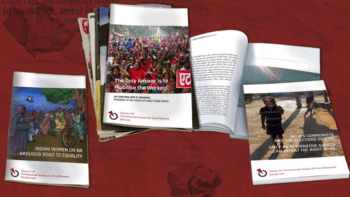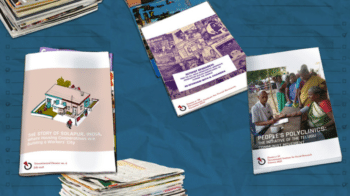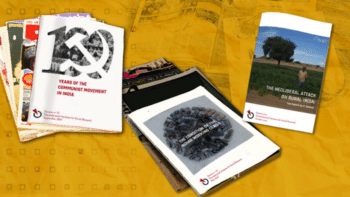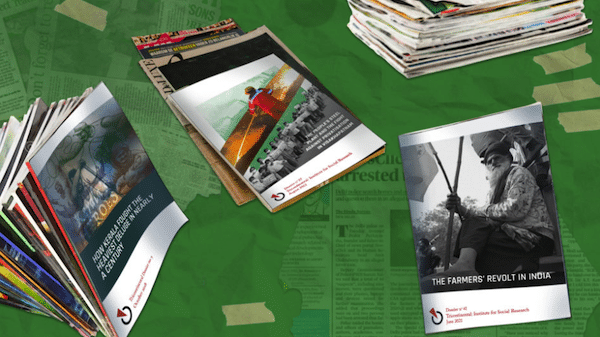Dear friends,
Greetings from the desk of Tricontinental: Institute for Social Research.
On 3 October, the homes and offices of over one hundred journalists and researchers across India were raided by the Delhi Police, which is under the jurisdiction of the country’s Ministry of Home Affairs. During this ‘act of sheer harassment and intimidation’, as the Committee to Protect Journalists called it, the Delhi Police raided and interrogated the Tricontinental Research Services (TRS) team. Based in Delhi, TRS is contracted by Tricontinental: Institute for Social Research to produce materials on the great processes of our time as they play out in the world’s most populous country, including the struggles of workers and farmers, the women’s movement, and the movement for Dalit emancipation from caste oppression. It would be a dereliction of duty for TRS researchers to ignore these important developments that affect the lives of hundreds of millions of Indians, and yet it is this very focus on issues of national importance that has earned them the ire of the government led by Prime Minister Narendra Modi. Is it possible to live in the world as a person of conscience and ignore the daily struggles of the people?
At the end of the day, the Delhi Police arrested Prabir Purkayastha and Amit Chakravarty, both of the media project NewsClick.
During the raid of the TRS office, the Delhi Police seized computers, phones, and hard drives. I very much hope that the Delhi Police investigators will read all of the materials that the TRS team has produced with great care and interest. So that the Delhi Police does not miss any of the important texts that TRS has produced for Tricontinental, here is a reading list for them:
 1. The Story of Solapur, India, Where Housing Cooperatives Are Building a Workers’ City (dossier no. 6, July 2018). Balamani Ambaiah Mergu, a maker of beedis (cigarettes), told TRS researchers that she used to ‘stay in a small hut in a slum in Shastri Nagar, Solapur city. When it rained the hut used to leak, and there wouldn’t be a single dry patch inside’. Since 1992, the Centre of Indian Trade Unions (CITU) has campaigned to secure dignified housing for workers in this town in the state of Maharashtra. Since 2001, CITU has been able secure government funds for this purpose and build tens of thousands of houses, a process led by the workers themselves through cooperative housing societies. The workers built ‘a city of the working class alone’, CITU leader Narasayya Adam told TRS.
1. The Story of Solapur, India, Where Housing Cooperatives Are Building a Workers’ City (dossier no. 6, July 2018). Balamani Ambaiah Mergu, a maker of beedis (cigarettes), told TRS researchers that she used to ‘stay in a small hut in a slum in Shastri Nagar, Solapur city. When it rained the hut used to leak, and there wouldn’t be a single dry patch inside’. Since 1992, the Centre of Indian Trade Unions (CITU) has campaigned to secure dignified housing for workers in this town in the state of Maharashtra. Since 2001, CITU has been able secure government funds for this purpose and build tens of thousands of houses, a process led by the workers themselves through cooperative housing societies. The workers built ‘a city of the working class alone’, CITU leader Narasayya Adam told TRS.
2. How Kerala Fought the Heaviest Deluge in Nearly a Century (dossier no. 9, October 2018). In the summer of 2018, rain, and subsequent flooding, swept through the southern coastal state of Kerala, impacting 5.4 million of the state’s 35 million residents. TRS researchers documented the flood’s rage, the rescue and relief work of organised volunteers (largely from left formations), and the rehabilitation of both the Left Democratic Front government and various social organisations.
3. India’s Communists and the Election of 2019: Only an Alternative Can Defeat the Right Wing (dossier no. 12, January 2019). To understand the political situation in India in the lead-up to the 2019 parliamentary elections, the TRS team spoke with Communist Party of India (Marxist) leader Brinda Karat. Rather than confine her analysis to the electoral or political sphere, Karat discussed the challenges facing the country at a sociological level: ‘Cultures promoted by capitalism and the market promote and glorify individualism and promote individualistic solutions. All these add to the depoliticisation of a whole generation of young people. This is certainly a challenge: how to find the most effective ways of taking our message to the youth’.
4. The Only Answer Is to Mobilise the Workers (dossier no. 18, July 2019). In April—May 2019, the National Democratic Alliance, led by the right-wing Bharatiya Janata Party, prevailed in India’s parliamentary elections. In the aftermath of the elections, the TRS team met with CITU President K. Hemalata to talk about the periodic massive strikes that had been taking place in the country, including an annual general strike of nearly 300 million workers. Whereas working-class movements in other countries seemed to be weakened by the breakdown of formal employment and the increasingly precarious nature of work, unions in India displayed resilience. Hemalata explained that ‘the contract workers are very militant’ and that CITU does not distinguish between the demands of contract workers and permanent workers. One of the best examples of this, she said, is the anganwadi (childcare) workers, who—along with Accredited Social Health Activists (ASHA) workers—have been on the forefront of many of the major agitations. Both of these sectors—childcare and health care—are dominated by women. ‘Organising working-class women is part of organising the working class’, Hemalata told TRS.
5. The Neoliberal Attack on Rural India (dossier no. 21, October 2019). P. Sainath, one of the most important journalists reporting on rural India and a senior fellow at Tricontinental: Institute for Social Research, traced the impact of the crises of neoliberal policies and climate catastrophe that are simultaneously imposed on India’s farmers. He documents the work of Kudumbashree, a cooperative made up of 4.5 million women farmers in Kerala, which he calls ‘the greatest gender justice and poverty reduction programme in the world’ (and about whom we will publish a longer study in the coming months compiled by TRS).
 6. People’s Polyclinics: The Initiative of the Telugu Communist Movement (dossier no. 25, February 2020). In the Telugu-speaking parts of India (which encompass over 84 million people), doctors affiliated with the communist movement have set up clinics and hospitals—notably the Nellore People’s Polyclinic—to provide medical care to the working class and peasantry. The polyclinics have not only provided care but have also trained medical workers to address public health concerns in rural hinterlands and small towns. This dossier offers a window into the work of left-wing medical personnel whose efforts take place outside the limelight and into the experiments in public health care that seek to undercut the privatisation agenda.
6. People’s Polyclinics: The Initiative of the Telugu Communist Movement (dossier no. 25, February 2020). In the Telugu-speaking parts of India (which encompass over 84 million people), doctors affiliated with the communist movement have set up clinics and hospitals—notably the Nellore People’s Polyclinic—to provide medical care to the working class and peasantry. The polyclinics have not only provided care but have also trained medical workers to address public health concerns in rural hinterlands and small towns. This dossier offers a window into the work of left-wing medical personnel whose efforts take place outside the limelight and into the experiments in public health care that seek to undercut the privatisation agenda.
7. One Hundred Years of the Communist Movement in India (dossier no. 32, September 2020). Not long after the October Revolution brought the Tsarist Empire to its knees in 1917, a liberal newspaper in Bombay noted, ‘The fact is Bolshevism is not the invention of Lenin or any man. It is the inexorable product of the economic system which dooms the millions to a life of ill-requited toil in order that a few thousand may revel in luxury’. In other words, the communist movement is the product of the limitations and failures of capitalism. On 17 October 1920, the Communist Party of India was formed alongside scattered communist groups that were emerging in different parts of India. In this brief text, the TRS team documents the role of the communist movement in India over the past century.
8. T he Farmers’ Revolt in India(dossier no. 41, June 2021). Between 1995 and 2014, almost 300,000 farmers committed suicide in India—roughly one farmer every 30 minutes. This is largely because of the high prices of inputs and the low prices of their crops, a reality that has been exacerbated by neoliberal agricultural policies since 1991 and their amplification of other crises (including the climate catastrophe). Over the past decade, however, farmers have fought back with major mobilisations across the country led by a range of organisations such as left-wing farmers’ and agricultural workers’ unions. When the government put forward three bills in 2020 to deepen the privatisation of rural India, farmers, agricultural workers, and their families began a massive protest. This dossier is one of the finest summaries of the issues that lie at the heart of these protests.
9. Indian Women on an Arduous Road to Equality (dossier no. 45, October 2021). Patriarchy, with its deep roots in the economy and culture, cannot be defeated by decree. In the face of this reality, this dossier offers a glimpse of the Indian women’s movement for equality and maps the range of struggles pursued by working women across the country to defend democracy, maintain secularism, fight for women’s economic rights, and defeat violence. The dossier closes with the following assessment: ‘The ongoing Indian farmers’ movement, which started before the pandemic and continues to stay strong, offers the opportunity to steer the national discourse towards such an agenda. The tremendous participation of rural women, who travelled from different states to take turns sitting at the borders of the national capital for days, is a historic phenomenon. Their presence in the farmers’ movement provides hope for the women’s movement in a post-pandemic future’.
10. The People’s Steel Plant and the Fight Against Privatisation in Visakhapatnam (dossier no. 55, August 2022). One of my favourite texts produced by the TRS team, this dossier tells the story of the workers of Rashtriya Ispat Nigam Limited, who have fought against the government’s attempts to privatise this public steel company. Not much is written about this struggle led by brave steel workers who are mostly forgotten or, if remembered, then maligned. They stand beside the furnaces, rolling the steel out and tempering it, driven by a desire to build better canals for the farmers, to build beams for schools and hospitals, and to build the infrastructure so that their communities can transcend the dilemmas of humanity. If you try to privatise the factory, they sing, ‘Visakha city will turn into a steel furnace, North Andhra into a battlefield… We will defend our steel with our lives’.
 11. Activist Research: How the All-India Democratic Women’s Association Builds Knowledge to Change the World (dossier no. 58, November 2022). The dossier on Visakha Steel was built in conversation with steel workers and reflected the evolving methodology of TRS. To sharpen this method, the team met with R. Chandra to discuss how the All-India Democratic Women’s Association (AIDWA) has used ‘activist research’ in the state of Tamil Nadu. Chandra shows how AIDWA designed surveys, trained local activists to conduct them among local populations, and taught the activists how to assess the results. ‘AIDWA’s members no longer need a professor to help them’, she told TRS. ‘They formulate their own questions and conduct their own field studies when they take up an issue. Since they know the value of the studies, these women have become a key part of AIDWA’s local work, bringing this research into the organisation’s campaigns, discussing the findings in our various committees, and presenting it at our different conferences’. This activist research not only produces knowledge of the particularities of hierarchies that operate in a given place; it also trains the activists to become ‘new intellectuals’ of their struggles and leaders in their communities.
11. Activist Research: How the All-India Democratic Women’s Association Builds Knowledge to Change the World (dossier no. 58, November 2022). The dossier on Visakha Steel was built in conversation with steel workers and reflected the evolving methodology of TRS. To sharpen this method, the team met with R. Chandra to discuss how the All-India Democratic Women’s Association (AIDWA) has used ‘activist research’ in the state of Tamil Nadu. Chandra shows how AIDWA designed surveys, trained local activists to conduct them among local populations, and taught the activists how to assess the results. ‘AIDWA’s members no longer need a professor to help them’, she told TRS. ‘They formulate their own questions and conduct their own field studies when they take up an issue. Since they know the value of the studies, these women have become a key part of AIDWA’s local work, bringing this research into the organisation’s campaigns, discussing the findings in our various committees, and presenting it at our different conferences’. This activist research not only produces knowledge of the particularities of hierarchies that operate in a given place; it also trains the activists to become ‘new intellectuals’ of their struggles and leaders in their communities.
12. The Condition of the Indian Working Class (dossier no. 64, May 2023). In the early days of the pandemic, the Indian government told millions of workers to go back to their homes, mostly in rural areas. Many of them walked thousands of kilometres under the burning hot sun, terrible stories of death and despair following their caravan. This dossier emerged out of a long-term interest in cataloguing the situation of India’s workers, whose precariousness was revealed in the early days of the pandemic. The last section of the dossier reflects on their struggles: ‘Class struggle is not the invention of unions or of workers. It is a fact of life for labour in the capitalist system.… In August 1992, textile workers in Bombay took to the streets in their undergarments, declaring that the new order would leave them in abject poverty. Their symbolic gesture continues to reflect the current reality of Indian workers in the twenty-first century: they have not surrendered in the face of the rising power of capital. They remain alive to the class struggle’.
The Delhi Police investigators who took the material from the TRS office have each of these twelve dossiers in hand. I recommend that they print them and share them with the rest of the force, including with Police Commissioner Sanjay Arora. If the Delhi Police is interested, I would be happy to develop a seminar on our materials for them.
Study and struggle shaped the Indian freedom movement. Gandhi, for instance, read voraciously and even translated Plato’s The Apology into Gujarati, rooted in the belief that reading and study sharpened his sense not only of how to struggle but how to build a better world.
Warmly,
Vijay

